Inside a Hoarder's Home
By Peter Walsh
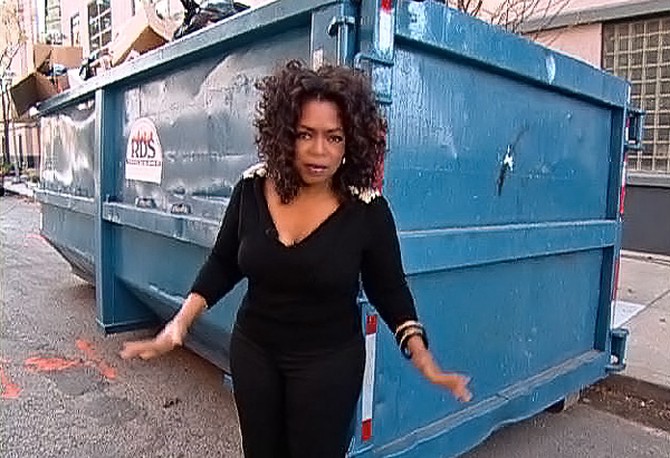
From closets overflowing with unworn clothes to boxes brimming with crafts and knickknacks, experts estimate that nearly 6 million Americans have a hoarding problem that affects their quality of life. But what if you had so much stuff, just the trash weighed 75 tons? To put it in perspective, it would take 15 huge dumpsters to hold that much trash. Imagine this amount of junk taking up every room, every hallway and every inch of space in your home. It seems impossible to live this way, but a heartbreaking home video introduced us to a husband and wife nearly buried alive by clutter.
From the outside, Sharyn and Marvin's 3,000-square-foot house looks like a typical American home. Step inside, however, and the foyer has become a narrow passage walled by stockpiles of possessions. The kitchen is drowning in bags and boxes filled with unused items. The family room is unrecognizable, with every piece of furniture covered in heaps of miscellaneous belongings.
Sharyn blames herself for the clutter. "I'm a shopaholic and I just buy and buy and buy." She describes her home as terrible, uncomfortable and suffocating. Breaking down into tears, Sharyn admits she needs help. "I don't know how I've done this to myself, to my husband, to my family. I don't want them to hate me. If I were to die tomorrow and they were left having to contend with all this stuff, I think they would end up hating me the rest of their lives. I want to be free of the clutter that's taking over my life."
From the outside, Sharyn and Marvin's 3,000-square-foot house looks like a typical American home. Step inside, however, and the foyer has become a narrow passage walled by stockpiles of possessions. The kitchen is drowning in bags and boxes filled with unused items. The family room is unrecognizable, with every piece of furniture covered in heaps of miscellaneous belongings.
Sharyn blames herself for the clutter. "I'm a shopaholic and I just buy and buy and buy." She describes her home as terrible, uncomfortable and suffocating. Breaking down into tears, Sharyn admits she needs help. "I don't know how I've done this to myself, to my husband, to my family. I don't want them to hate me. If I were to die tomorrow and they were left having to contend with all this stuff, I think they would end up hating me the rest of their lives. I want to be free of the clutter that's taking over my life."
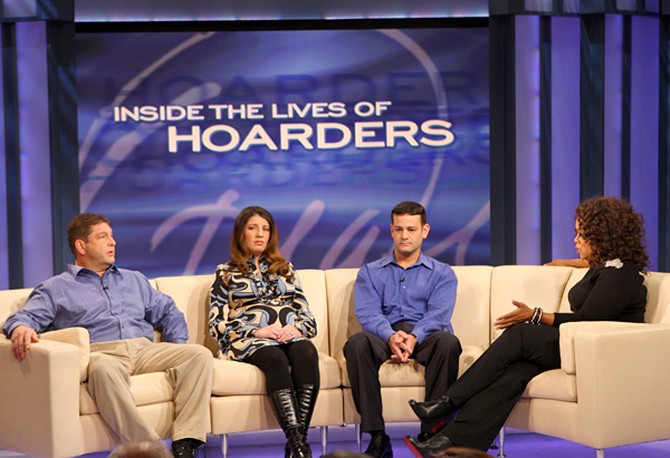
Sharyn and Marvin's children, Jodi, Steve and Rich, say their parents' home wasn't always filled with clutter. "It gradually happened little by little," Jodi says. "I think as each one of us moved out, it got worse and worse. I was the last one out and after that, it just got really bad." At first, she says the hoarding was seen as a minor issue—only the basement and a back room were used for storage. Then, Sharyn filled the garage. "It went from a three car garage, going down to a two car, to a one car, to a no car," Jodi says. Over the next 10 years, Sharyn's hoarding filled the entire home.
Not only does the clutter create chaotic conditions, but Steve is concerned for his parents' safety. "God forbid there would be a fire or something and they'd have to get out," he says.
Over the years, Rich says he and his family have stopped visiting the house. Now, for the first time in five years, Rich steps into his parents' home.
Watch Rich's return home.
"Holy shipwreck," he says as he enters the foyer. Having to turn sideways to squeeze through the mounds of clutter, Rich is stunned by the sheer amount of possessions. "This stuff doesn't mean anything, I mean—it's meaningless," Rich says. "She can't have space with nothing in it. This has consumed her. I feel sorry for anybody who has to live like this, I really do."
After touring the space that was still accessible in the home, Rich says he feels devastated. "I came in with energy. I came in thinking I could make a dent in this. I mean, you can't even make space. I'm wiped out. I haven't touched anything, I haven't lifted a thing—I'm wiped out. I'm physically and emotionally drained. It's overwhelming," he says.
Not only does the clutter create chaotic conditions, but Steve is concerned for his parents' safety. "God forbid there would be a fire or something and they'd have to get out," he says.
Over the years, Rich says he and his family have stopped visiting the house. Now, for the first time in five years, Rich steps into his parents' home.
Watch Rich's return home.
"Holy shipwreck," he says as he enters the foyer. Having to turn sideways to squeeze through the mounds of clutter, Rich is stunned by the sheer amount of possessions. "This stuff doesn't mean anything, I mean—it's meaningless," Rich says. "She can't have space with nothing in it. This has consumed her. I feel sorry for anybody who has to live like this, I really do."
After touring the space that was still accessible in the home, Rich says he feels devastated. "I came in with energy. I came in thinking I could make a dent in this. I mean, you can't even make space. I'm wiped out. I haven't touched anything, I haven't lifted a thing—I'm wiped out. I'm physically and emotionally drained. It's overwhelming," he says.
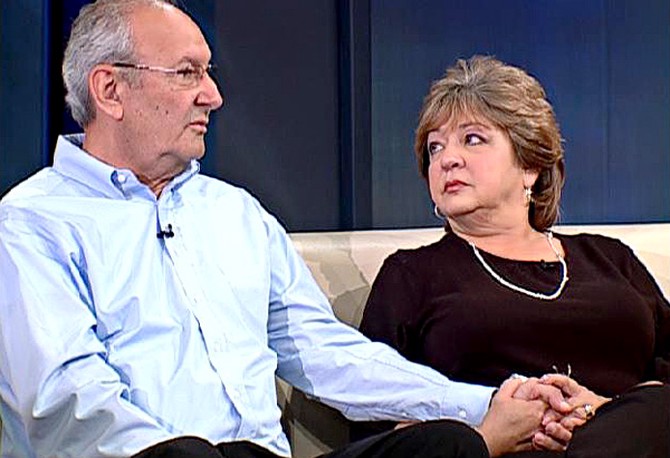
Sharyn admits that shopping is her weakness. "When I shop and I find a good deal, it's total excitement that I got something special for my money," she says. "I love seeing sale signs when I go into a store. It's like a magnet just drawing me to it. And I can find deals like nobody else can find."
She also loves to buy gifts for her friends and family—but instead of giving them away, she hoards them. "She'll buy gifts maybe six months, nine months, a year in advance," Marvin says. "And then when it's time to give the gift, of course she doesn't know where she put it."
Sharyn also has a problem with collecting. "I don't have one of anything in my house. If I have one pair of sunglasses, I have 10. And if I was going to learn I needed a pair of sunglasses, sometimes I wouldn't even be able to find one."
Like their daughter, Jodi, Marvin says he noticed the hoarding began as their children grew up and began moving out. "It wasn't like this 10 years ago," he says. "I think the empty-nest syndrome is probably really what started it. She was trying to replace the children with things." Marvin cannot pinpoint the moment he realized his wife was a hoarder and says it was a slow progression. "I'd be sitting on the couch and I would just look up and it was unlivable," he says. "I would ask her, 'Please, we have to start cleaning the house out. Please.' And she'd say, 'Okay, we'll start tomorrow, or we'll start Monday,' or whatever day."
Sharyn says she thinks that recent deaths in her family have also caused her hoarding to become more extreme. "I suffered a lot of loss of family members in the last couple years and I really think that has a lot to do with it—it's filling a void," she says.
She also loves to buy gifts for her friends and family—but instead of giving them away, she hoards them. "She'll buy gifts maybe six months, nine months, a year in advance," Marvin says. "And then when it's time to give the gift, of course she doesn't know where she put it."
Sharyn also has a problem with collecting. "I don't have one of anything in my house. If I have one pair of sunglasses, I have 10. And if I was going to learn I needed a pair of sunglasses, sometimes I wouldn't even be able to find one."
Like their daughter, Jodi, Marvin says he noticed the hoarding began as their children grew up and began moving out. "It wasn't like this 10 years ago," he says. "I think the empty-nest syndrome is probably really what started it. She was trying to replace the children with things." Marvin cannot pinpoint the moment he realized his wife was a hoarder and says it was a slow progression. "I'd be sitting on the couch and I would just look up and it was unlivable," he says. "I would ask her, 'Please, we have to start cleaning the house out. Please.' And she'd say, 'Okay, we'll start tomorrow, or we'll start Monday,' or whatever day."
Sharyn says she thinks that recent deaths in her family have also caused her hoarding to become more extreme. "I suffered a lot of loss of family members in the last couple years and I really think that has a lot to do with it—it's filling a void," she says.
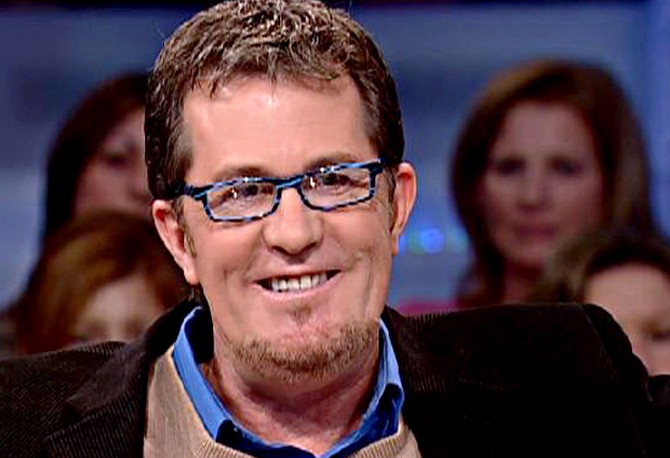
To help get their home back in order, organizational expert Peter Walsh, author of It's All Too Much, is sent in to literally dig Sharyn and Marvin out. Peter estimates that it will take eight weeks and a team of 100 people to rescue this home. But whether you have a team of 100 or a team of one, Peter says there is one key question all hoarders must ask themselves before taking out a single bag of trash—what do you want from your home?
"Peace. Harmony. Neatness. Tidiness. A place to call home. A comfort zone I'm happy to be in," Sharyn says.
"A place that our family and friends can come visit—it's been a long time," Marvin says. So long, in fact, that Sharyn and Marvin estimate that they haven't had their friends over in 12 years.
Peter says Sharyn and Marvin must keep these things in mind as they decide what stays and what goes from their home. "So now this is the starting point, because constantly throughout the next couple of weeks, you have to keep coming back to what you want from this house," he says. "One of the biggest problems with clutter is that people focus on the stuff. And if you start there, you can never succeed. What's your vision for the life you want, the home you want, this room? You have to hold that in mind. Because without that, you're lost before you start."
"Peace. Harmony. Neatness. Tidiness. A place to call home. A comfort zone I'm happy to be in," Sharyn says.
"A place that our family and friends can come visit—it's been a long time," Marvin says. So long, in fact, that Sharyn and Marvin estimate that they haven't had their friends over in 12 years.
Peter says Sharyn and Marvin must keep these things in mind as they decide what stays and what goes from their home. "So now this is the starting point, because constantly throughout the next couple of weeks, you have to keep coming back to what you want from this house," he says. "One of the biggest problems with clutter is that people focus on the stuff. And if you start there, you can never succeed. What's your vision for the life you want, the home you want, this room? You have to hold that in mind. Because without that, you're lost before you start."
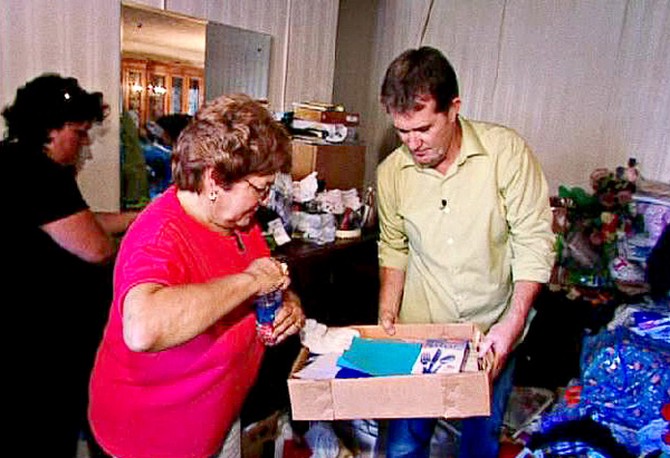
Peter and a team of six professional organizers begin the challenge of helping Sharyn and Marvin sort through their belongings. First up is the living room and dining room. "Ninety-five percent of what's in here has to go," Peter says.
He starts by dividing the front lawn into four sections: Keep, Sell, Donate and Trash. Peter makes Sharyn the director, and she gets to decide which pile everything goes in. As boxes and bags come bustling past her, Sharyn's anxiety level escalates. "I know I need to get rid of this. You've just got to give me a little bit of time," she says. As the hours go by, Sharyn is able to let go of many of her possessions...although some more easily than others.
The team makes a dangerous discovery—underneath five feet of junk, they find boxes of pasta rotting into the carpet.
As the first week of cleaning comes to an end, Peter gives Sharyn and Marvin three assignments to complete on their own the following week. He asks them to clear out their china cabinet, fill two garbage bags—one for charity and one for trash—once a day and demands that Sharyn stops shopping. Sharyn says she usually shops every day but she won't do it anymore now that Peter's here. "Not after this man came into my life," Sharyn says.
He starts by dividing the front lawn into four sections: Keep, Sell, Donate and Trash. Peter makes Sharyn the director, and she gets to decide which pile everything goes in. As boxes and bags come bustling past her, Sharyn's anxiety level escalates. "I know I need to get rid of this. You've just got to give me a little bit of time," she says. As the hours go by, Sharyn is able to let go of many of her possessions...although some more easily than others.
The team makes a dangerous discovery—underneath five feet of junk, they find boxes of pasta rotting into the carpet.
As the first week of cleaning comes to an end, Peter gives Sharyn and Marvin three assignments to complete on their own the following week. He asks them to clear out their china cabinet, fill two garbage bags—one for charity and one for trash—once a day and demands that Sharyn stops shopping. Sharyn says she usually shops every day but she won't do it anymore now that Peter's here. "Not after this man came into my life," Sharyn says.
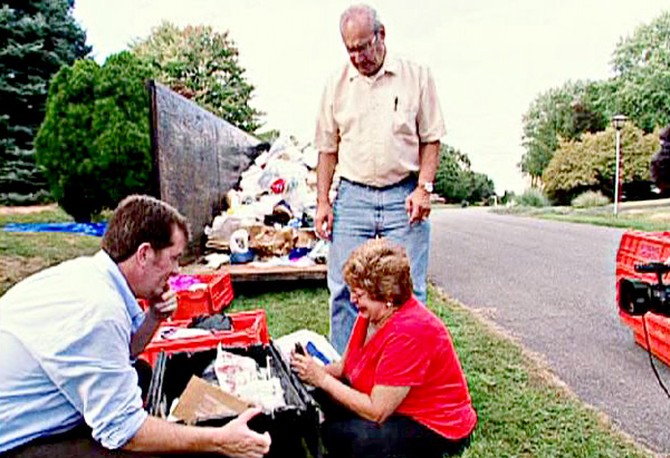
For someone who hoards, sorting through possessions can be a painful process. An emotional moment sets in for Sharyn when Marvin discovers a wallet filled with pictures. Through her tears, Sharyn explains that this was her father's wallet. "It's just a small piece of my father that I have left," she says.
"That should have a place of honor and respect in the house, and yet it's buried in all this stuff," Peter says. "If you respect that so much, what's it doing buried in the stuff? So we need to pull that out and make sure that it has a place of honor and respect with the stuff in the house."
Peter explains that understanding value is a vital step. "When everything is important, I believe nothing is important," he says. "And so it's really critical to honor and respect the things that you say are of value. And if you don't do that, what are they doing in your home? And that was the problem here. Something of such huge emotional value was buried."
"That should have a place of honor and respect in the house, and yet it's buried in all this stuff," Peter says. "If you respect that so much, what's it doing buried in the stuff? So we need to pull that out and make sure that it has a place of honor and respect with the stuff in the house."
Peter explains that understanding value is a vital step. "When everything is important, I believe nothing is important," he says. "And so it's really critical to honor and respect the things that you say are of value. And if you don't do that, what are they doing in your home? And that was the problem here. Something of such huge emotional value was buried."
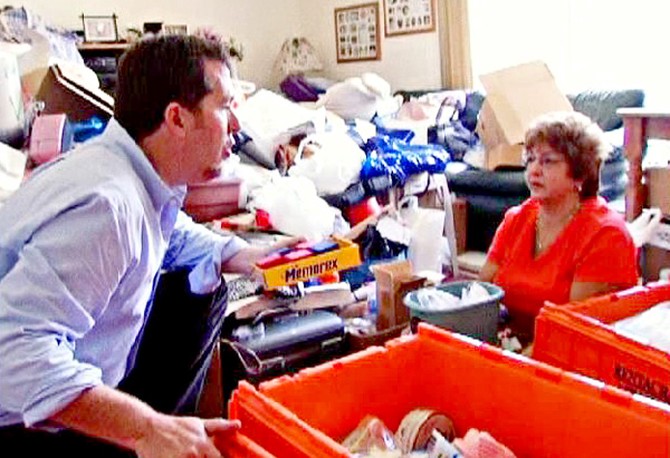
Peter and Sharyn tackle the thousands of gifts she bought but never gave away. It's an important lesson in setting limits.
At the beginning of the process, Peter allows Sharyn one bin of gifts to keep. Sharyn says she needs more than that. "I'm wondering if six is enough," she says.
When Peter tells her she needs to come to a decision, Sharyn asks for eight bins, then 10. Peter refuses to bargain with Sharyn and urges her to pick a lower number of bins. "The reason I am pushing you is that if you don't set limits now, you will be in this position again within a year," he says. "I'm sorry to push you, but we have to start establishing limits because you have none."
Sharyn settles on eight. "It's just overwhelming," she says. "I don't ever want to be in this place again. Ever. Not ever."
Setting boundaries is an important lesson for everyone to learn, not just hoarders, Peter says. "It's easy to look at this and say this is so extreme, it's not me. But all of us are in this," Peter says. "If you don't have a limit for the number of holiday decorations in your garage or the dresses hanging in your closet or the number of tools on your work bench. If you don't limit your children or yourself, then this is the result."
"Wherever there is clutter, wherever there is chaos, wherever this is confusion in your own life, the message of this ... is that there's always hope and that there is a way, no matter who you are, out of what appears to be no way," Oprah says. "Change is possible," Peter says.
At the beginning of the process, Peter allows Sharyn one bin of gifts to keep. Sharyn says she needs more than that. "I'm wondering if six is enough," she says.
When Peter tells her she needs to come to a decision, Sharyn asks for eight bins, then 10. Peter refuses to bargain with Sharyn and urges her to pick a lower number of bins. "The reason I am pushing you is that if you don't set limits now, you will be in this position again within a year," he says. "I'm sorry to push you, but we have to start establishing limits because you have none."
Sharyn settles on eight. "It's just overwhelming," she says. "I don't ever want to be in this place again. Ever. Not ever."
Setting boundaries is an important lesson for everyone to learn, not just hoarders, Peter says. "It's easy to look at this and say this is so extreme, it's not me. But all of us are in this," Peter says. "If you don't have a limit for the number of holiday decorations in your garage or the dresses hanging in your closet or the number of tools on your work bench. If you don't limit your children or yourself, then this is the result."
"Wherever there is clutter, wherever there is chaos, wherever this is confusion in your own life, the message of this ... is that there's always hope and that there is a way, no matter who you are, out of what appears to be no way," Oprah says. "Change is possible," Peter says.
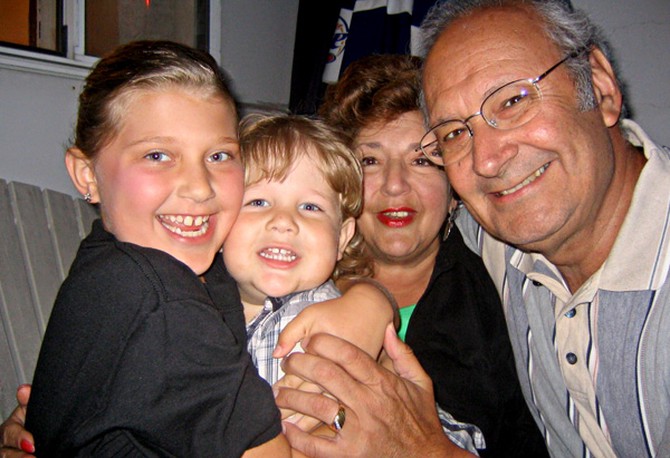
Dr. David Tolin, co-author of Buried in Treasures, is one of the country's leading experts on hoarding. He sat down with Sharyn to uncover the deeper psychological issues that could be contributing to her hoarding.
Dr. Tolin asks Sharyn how serious her problem is. "The highest number you can go to," she says. "And it's really, really gotten bad recently."
In the past two years, Sharyn says she's lost her brother and her sister. "I don't know if I'm trying to fill my life with things to replace the emptiness," she says.
"It sounds like you're trying to fill a hole, but the hole's not getting any smaller as you fill it," Dr. Tolin says. "In fact, I think I'm hearing the opposite, that if anything, it's getting bigger. You're feeling worse and worse."
Sharyn says her hoarding has taken away the ability to have her family and friends come over. "I'm embarrassed to even let my kids in here," she says. "My granddaughter is going to be 12. She probably hasn't been in my house in the past six years. And my grandson is gonna be 5, and he's never been in my house."
Dr. Tolin says that Sharyn has been defining herself as a good grandmother based on what she buys, not what she does. "They need you. They need a grandma who's present and can have them over and can spend time with them in her house," he says. "And it sounds like [you feel] the best way for you to show your love for your grandkids is to buy things—not even necessarily to give them—just to buy them, because you're thinking about them. But the thought doesn't make you a good grandma. The actions do."
Dr. Tolin asks Sharyn how serious her problem is. "The highest number you can go to," she says. "And it's really, really gotten bad recently."
In the past two years, Sharyn says she's lost her brother and her sister. "I don't know if I'm trying to fill my life with things to replace the emptiness," she says.
"It sounds like you're trying to fill a hole, but the hole's not getting any smaller as you fill it," Dr. Tolin says. "In fact, I think I'm hearing the opposite, that if anything, it's getting bigger. You're feeling worse and worse."
Sharyn says her hoarding has taken away the ability to have her family and friends come over. "I'm embarrassed to even let my kids in here," she says. "My granddaughter is going to be 12. She probably hasn't been in my house in the past six years. And my grandson is gonna be 5, and he's never been in my house."
Dr. Tolin says that Sharyn has been defining herself as a good grandmother based on what she buys, not what she does. "They need you. They need a grandma who's present and can have them over and can spend time with them in her house," he says. "And it sounds like [you feel] the best way for you to show your love for your grandkids is to buy things—not even necessarily to give them—just to buy them, because you're thinking about them. But the thought doesn't make you a good grandma. The actions do."
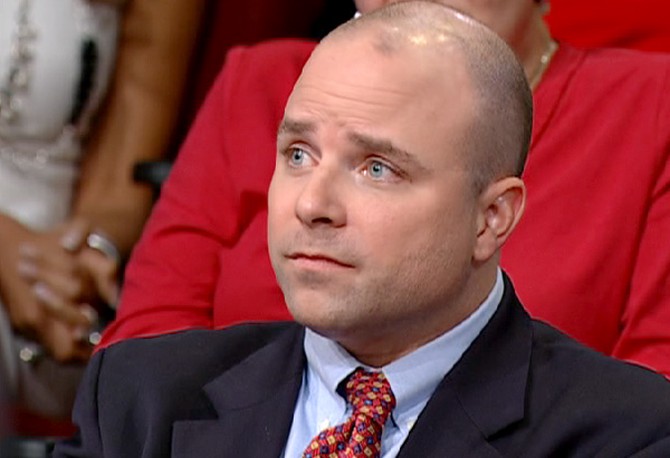
Tragic events or feelings of loss could have also triggered Sharyn's urge to hoard, Dr. Tolin says. "You probably start with a person who's already vulnerable and several different levels to develop this problem, and then something happens that kind of pushes them over the edge," he says. "But, again, lots of people lose things, lose people, face losses, have bad things happen in their lives, and this isn't necessarily how they react. So it would be oversimplifying things to say that's the cause."
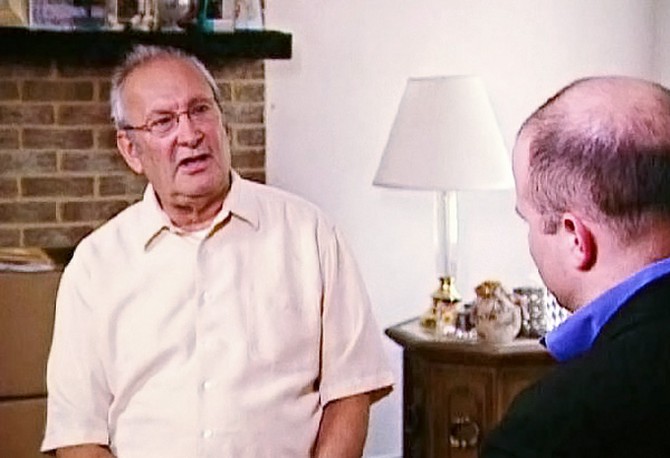
Dr. Tolin also sits down with Marvin, who says that when he and Sharyn dated, her room at her parents' house was also cluttered. "That keeps on flashing back into my mind. I mean, I knew what she was like," Marvin says. "I guess I blame myself in a sense because she's my wife and I didn't know how to stop her from doing what she was doing."
Marvin says he feels like part of the hoarding is his fault, but he never knew how to put his foot down. "How do you do that? I mean, do I walk out of the house? And then what's she gonna do? She couldn't handle this by herself. There's no way. The most important thing is if you love each other. I mean, you can have the cleanest house in the world and if you don't love each other, you know, what good is it?"
Dr. Tolin says he sympathizes with Marvin's position. "On the one hand, it's easier for us looking at this for the first time and think, 'Oh, my God, this is shocking. Why don't you do something about this?'" he says. "But I also find it's awfully hard to win an argument about hoarding. I've tried and I lose all the time. And my guess is that Marvin's lost these arguments as well."
Dr. Tolin says Marvin is in a tough position. "On the one hand, he wants Sharyn to start working on this problem and clearing out the clutter," Dr. Tolin says. "But on the other hand, the more he pushes, the more it seems to drive a wedge between him and his wife. He's really stuck."
Marvin says he feels like part of the hoarding is his fault, but he never knew how to put his foot down. "How do you do that? I mean, do I walk out of the house? And then what's she gonna do? She couldn't handle this by herself. There's no way. The most important thing is if you love each other. I mean, you can have the cleanest house in the world and if you don't love each other, you know, what good is it?"
Dr. Tolin says he sympathizes with Marvin's position. "On the one hand, it's easier for us looking at this for the first time and think, 'Oh, my God, this is shocking. Why don't you do something about this?'" he says. "But I also find it's awfully hard to win an argument about hoarding. I've tried and I lose all the time. And my guess is that Marvin's lost these arguments as well."
Dr. Tolin says Marvin is in a tough position. "On the one hand, he wants Sharyn to start working on this problem and clearing out the clutter," Dr. Tolin says. "But on the other hand, the more he pushes, the more it seems to drive a wedge between him and his wife. He's really stuck."
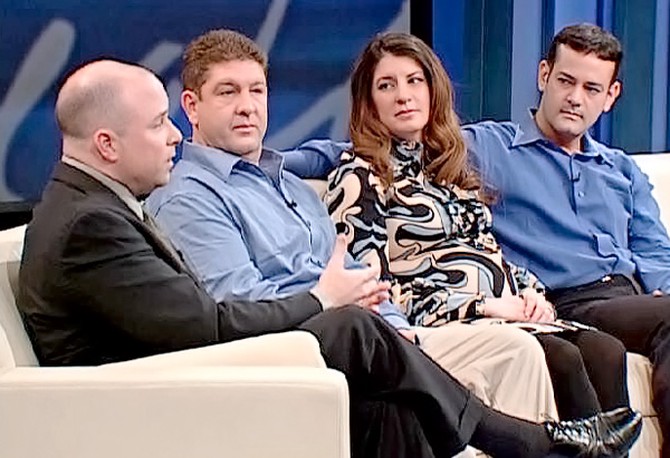
How can Sharyn's family help keep her hoarding in check so this doesn't happen again? "Sharyn's off to a great start, and I think what Sharyn and Marvin and the kids are all bearing in mind that is really important is that this cannot just be about the stuff. It is not about physical possessions," Dr. Tolin says. "If it were that simple, all we'd need to do is clear out the house and the problem would be solved."
Dr. Tolin says Sharyn needs to clear her head, not just her house. "She needs to really reorganize not just her possessions, but the way she thinks about her possessions. She needs to alter her behavior in a fundamental way so that this problem doesn't grow," Dr. Tolin says. "And the best thing for the family to do is support her without pushing. Because if they push, they're just going to get a push back."
The psychology of a hoarder is why Peter says you can't clean up someone's mess for them. "They just get more and more entrenched. It's like the argument. Once you start arguing about the stuff, someone has to win and someone has to lose. And I can guarantee it, the person who has all the clutter or the hoarder will never lose that argument ever," Peter says.
Peter thinks Sharyn is on the right path. "Sharyn's ready, she's agreed for ongoing help, the family have agreed to monitor it. Sharyn has agreed to get into some substitute activity, into some volunteer work. She stopped shopping," Peter says. "I think all the indicators are there that she is on track and that change is possible."
It took a lot of hard work, a team of people and a heavy duty cleaning crew... See the dramatic results of Sharyn's home makeover.
Could you have a hoarding problem? Take this self-assessment.
Dr. Tolin says Sharyn needs to clear her head, not just her house. "She needs to really reorganize not just her possessions, but the way she thinks about her possessions. She needs to alter her behavior in a fundamental way so that this problem doesn't grow," Dr. Tolin says. "And the best thing for the family to do is support her without pushing. Because if they push, they're just going to get a push back."
The psychology of a hoarder is why Peter says you can't clean up someone's mess for them. "They just get more and more entrenched. It's like the argument. Once you start arguing about the stuff, someone has to win and someone has to lose. And I can guarantee it, the person who has all the clutter or the hoarder will never lose that argument ever," Peter says.
Peter thinks Sharyn is on the right path. "Sharyn's ready, she's agreed for ongoing help, the family have agreed to monitor it. Sharyn has agreed to get into some substitute activity, into some volunteer work. She stopped shopping," Peter says. "I think all the indicators are there that she is on track and that change is possible."
It took a lot of hard work, a team of people and a heavy duty cleaning crew... See the dramatic results of Sharyn's home makeover.
Could you have a hoarding problem? Take this self-assessment.
Published 11/15/2007

